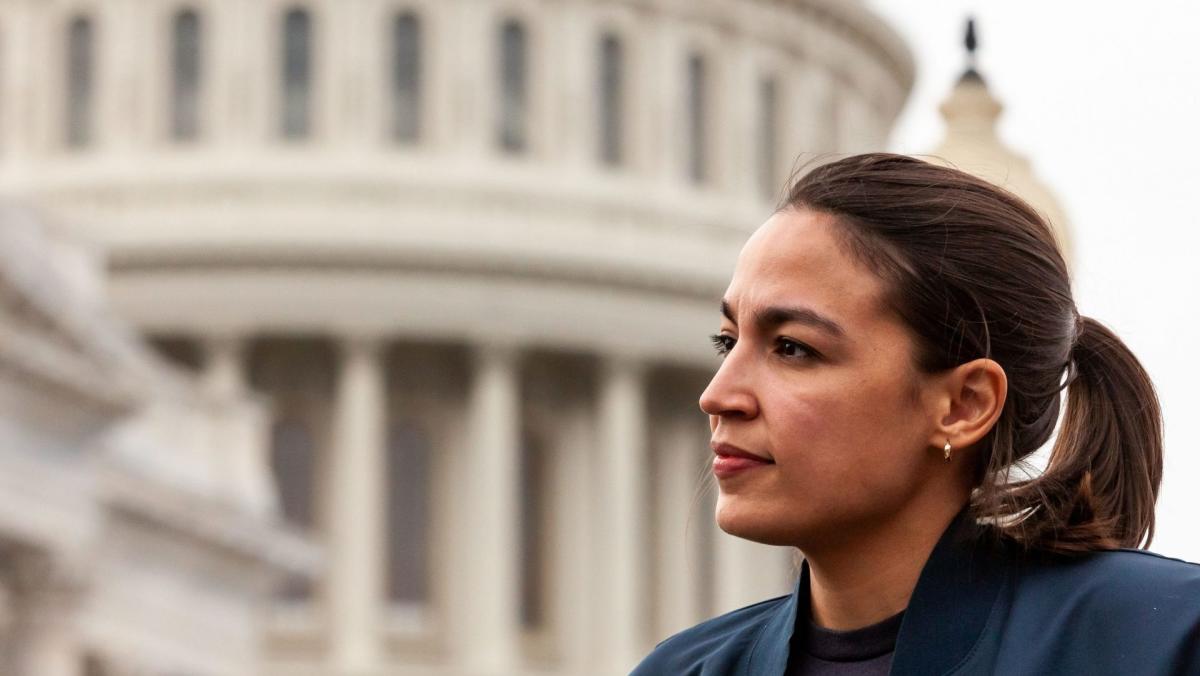AOC Net Worth: Unveiling The Truth Behind The Claims And Reality
Is Alexandria Ocasio-Cortez, the firebrand congresswoman known as AOC, secretly a millionaire? The persistent rumors of her vast wealth, fueled by viral memes and social media accusations, clash sharply with official financial disclosures, painting a confusing picture of her true net worth.
The fascination with AOC's finances stems, in part, from her rapid rise to political prominence. Just a few years ago, she was a bartender, a stark contrast to the often-wealthy backgrounds of many members of Congress. This narrative of an "outsider" taking on the establishment makes her financial status a point of intense scrutiny. Claims of hidden wealth, particularly in a political climate rife with accusations of corruption, are easily amplified, regardless of their veracity. A user on X (formerly Twitter) claimed on May 27, 2023, that AOC possesses a net worth far exceeding what her publicly declared income would suggest. Such claims often fail to account for potential investment gains, book royalties, or other legitimate sources of income, instead relying on sensationalism and innuendo. For example, a meme circulating online boldly stated that AOC had accumulated a net worth of $29 million, transforming from a "broke bartender" into a financial powerhouse. This figure, however, has no basis in reality and is a prime example of the misinformation that plagues discussions surrounding AOC's finances. The reality, as revealed in her financial disclosures, is far more modest.
| Category | Details |
|---|---|
| Full Name | Alexandria Ocasio-Cortez |
| Nickname | AOC |
| Date of Birth | October 13, 1989 |
| Age (as of October 27, 2024) | 35 |
| Occupation | U.S. Representative for New York's 14th congressional district |
| Previous Occupations | Bartender, Community Organizer, Educator |
| Years in Congress | Since 2019 |
| Annual Congressional Salary | Approximately $174,000 |
| Reported Net Worth (Based on 2024 Financial Disclosures) | Likely Less than $500,000 |
| Bank Accounts (Reported) | Between $1,001 and $15,000 in three different bank accounts |
| Liabilities (Reported) | Student loans ranging from $15,000 to $50,000 |
| Assets (Reported) | Ranging from $3,003 to $45,000 |
| Political Popularity | Third most popular U.S. politician on Twitter (after Barack Obama and Donald Trump) |
| Instagram Activity | Active presence, sharing images and updates (as seen in a March 5 post) |
| Source of Information | U.S. House of Representatives Committee on Financial Services |
Official records offer a more grounded assessment. AOC's financial disclosures, publicly accessible and subject to scrutiny, paint a picture of someone far from the multi-millionaire status suggested by online rumors. A 2024 filing indicated that she held between $1,001 and $15,000 in each of three different bank accounts. While these figures are not insignificant, they hardly represent the kind of wealth that would warrant accusations of financial impropriety. Furthermore, these disclosures also reveal that AOC carries student loan debt, ranging from $15,000 to $50,000, a burden shared by many Americans, particularly those who pursued higher education before entering politics. Her assets, according to official records, range from $3,003 to $45,000, further reinforcing the image of a relatively modest financial portfolio. These figures directly contradict the outlandish claims of a $29 million net worth, highlighting the vast discrepancy between online conjecture and verified financial data.
- Aagmaal Men Unveiling The Trend What You Need To Know
- Sean Parker From Napster To Facebook His Untold Story
The narrative surrounding AOC's net worth also touches upon broader discussions about compensation for members of Congress. In the past, AOC has expressed the view that the current salary of approximately $174,000 per year may not be sufficient, stating, "I know it's kind of a contrarian position." This stance has drawn both support and criticism, with some arguing that a higher salary would attract a more diverse range of candidates, while others contend that it is already a generous sum, especially considering the economic realities faced by many of their constituents. The debate over congressional salaries often intersects with concerns about campaign finance, lobbying, and the potential for undue influence by wealthy donors. The perception that members of Congress are financially out of touch with the average American can fuel distrust and contribute to the spread of unsubstantiated claims about their personal wealth.
The focus on AOCs financial situation also speaks to the intense political polarization that characterizes contemporary American society. As a prominent progressive voice and a frequent target of conservative criticism, she is often subjected to heightened scrutiny, with even minor details of her life and career dissected and debated online. The spread of misinformation about her net worth is arguably a manifestation of this political dynamic, with opponents eager to seize on any perceived weakness or vulnerability. The fact that even some "Trump fans" have seemingly offered "kudos" in response to AOC's own statements about her relatively low net worth suggests that the issue transcends partisan divides and taps into broader anxieties about wealth inequality and political corruption. The willingness to believe unsubstantiated rumors, regardless of their source, underscores the erosion of trust in institutions and the media, making it increasingly difficult to discern fact from fiction.
It's important to consider the context in which these claims about AOC's wealth circulate. The internet, and social media in particular, has become a breeding ground for misinformation and conspiracy theories. Algorithms often prioritize engagement over accuracy, meaning that sensational and inflammatory content is more likely to spread virally, regardless of its truthfulness. In the case of AOC's net worth, the claims are often amplified by bots and fake accounts, further distorting the online conversation. The anonymity afforded by the internet also emboldens individuals to make unfounded accusations without fear of accountability. This creates a challenging environment for fact-checking and debunking, as false information can quickly proliferate and become entrenched in the public consciousness. The sheer volume of online content makes it difficult for individuals to separate credible sources from unreliable ones, leading to a widespread erosion of trust in traditional media outlets and expert opinion.
- Scott Jennings Autumn Stiff Marriage Net Worth Family
- Hyungry Temporary Replacement Ep 3 A Deep Dive More
Furthermore, the discussion surrounding AOC's finances is often intertwined with gendered and class-based stereotypes. As a young, working-class woman of color, she defies traditional expectations of what a politician should look like and how they should behave. This can make her a target for those who feel threatened by her success and who seek to undermine her credibility. The focus on her past as a bartender, for example, is often used to suggest that she is somehow unqualified or incapable of managing her finances responsibly. These types of attacks are often rooted in prejudice and are designed to reinforce existing power structures. The double standards that women and minorities often face in politics contribute to the spread of misinformation and make it more difficult for them to be taken seriously.
The ongoing saga of AOC's purported wealth serves as a cautionary tale about the dangers of misinformation and the importance of critical thinking in the digital age. It highlights the ease with which false narratives can spread online, particularly when they tap into existing biases and anxieties. It underscores the need for individuals to be discerning consumers of information, to seek out credible sources, and to be wary of sensational claims that lack evidence. It also points to the responsibility of social media platforms to combat the spread of misinformation and to promote responsible online discourse. Finally, it reminds us that the pursuit of truth and accuracy is essential for a healthy democracy.
Examining AOCs actual financial disclosures provides a clearer picture. It is important to note that members of Congress are required to file these disclosures annually, detailing their assets, liabilities, and sources of income. These documents are public record and are subject to review by ethics committees. While the disclosures provide a range rather than exact figures, they offer a reliable overview of a politicians financial situation. In AOCs case, her disclosures consistently show a modest net worth, far below the millions of dollars claimed in online rumors. These disclosures include information about her bank accounts, investments, and debts, providing a transparent account of her financial holdings. By consulting these official sources, it is possible to debunk the false narratives and gain a more accurate understanding of her true financial status.
Adding complexity is the fact that financial disclosures can be easily misinterpreted. They often require politicians to report assets and liabilities in broad ranges, making it difficult to determine an exact net worth. For example, a politician might report holding between $1,000 and $15,000 in a particular investment account. This range allows for some ambiguity and can be exploited by those seeking to inflate or deflate a politicians perceived wealth. Moreover, financial disclosures do not necessarily capture all sources of income, such as royalties from books or speaking fees. However, even when accounting for these potential sources of income, it is highly unlikely that AOCs net worth would approach the levels claimed in online rumors. The limitations of financial disclosures should be acknowledged, but they remain a valuable tool for assessing a politicians financial situation and holding them accountable.
The role of media, both traditional and social, in shaping public perception of AOC's wealth cannot be overstated. Mainstream media outlets have generally been responsible in reporting on her financial disclosures, but the sheer volume of misinformation circulating online makes it difficult to control the narrative. Social media platforms, in particular, have become echo chambers for conspiracy theories and unsubstantiated claims. Algorithms often prioritize engagement over accuracy, meaning that sensational and inflammatory content is more likely to spread virally, regardless of its truthfulness. This creates a challenging environment for fact-checking and debunking, as false information can quickly proliferate and become entrenched in the public consciousness. The responsibility lies with both media outlets and individuals to critically evaluate the information they consume and to avoid spreading misinformation, even if it confirms their pre-existing beliefs.
Ultimately, the question of AOC's net worth is not just a matter of personal finance, but a reflection of the broader political and social landscape. The spread of misinformation about her wealth underscores the challenges of maintaining a fact-based discourse in the digital age. It highlights the importance of critical thinking, media literacy, and responsible online behavior. It also serves as a reminder that politicians, like all individuals, are entitled to a fair and accurate portrayal of their lives and careers. By focusing on verified facts and avoiding unsubstantiated claims, it is possible to have a more informed and productive conversation about AOC's role in American politics.
Tasos Katopodis/Getty Images captured moments of AOC in Congress, reflecting her active participation in legislative processes. These images stand in stark contrast to the often-caricatured portrayals of her circulating online. Furthermore, Kevin Mazur/MG21/Met Museum/Vogue/Getty Images documented her presence at high-profile events, showcasing her influence and visibility within the broader cultural landscape. These visual representations, when viewed alongside verified financial data, provide a more balanced and nuanced understanding of AOC's position in American society.
The discussion surrounding AOC's net worth also touches upon the broader issue of wealth inequality in the United States. The gap between the rich and the poor has been widening for decades, leading to a sense of resentment and distrust towards the wealthy elite. This resentment can be easily exploited by those seeking to spread misinformation and to demonize political opponents. The focus on AOC's supposed wealth, even though it is largely unfounded, taps into these anxieties and serves to distract from the real issues of wealth inequality and economic injustice. It is important to address these underlying issues in order to create a more fair and equitable society.
While AOC is the third most popular US politician on Twitter after Barack Obama and Donald Trump, this popularity also makes her a target for misinformation campaigns. Her large following amplifies both accurate and inaccurate information, making it difficult to control the narrative. The challenge lies in promoting responsible online discourse and in encouraging individuals to critically evaluate the information they consume. Social media platforms have a responsibility to combat the spread of misinformation, but ultimately it is up to each individual to be a discerning consumer of information.
In conclusion, while claims of vast wealth surrounding Alexandria Ocasio-Cortez persist online, verified financial disclosures and a critical assessment of the available evidence paint a different picture. The spread of misinformation about her net worth underscores the challenges of maintaining a fact-based discourse in the digital age and highlights the importance of critical thinking, media literacy, and responsible online behavior. By focusing on verified facts and avoiding unsubstantiated claims, it is possible to have a more informed and productive conversation about AOC's role in American politics.
- Watch Now Hungry Temporary Replacement Ep 2 What To Expect
- Hyungry Temp Replacement Ep 3 Mustsee Moments Amp Where To Watch

How Much Is Alexandria Ocasio Cortez Worth?

AOC Net Worth A Comprehensive Guide To Alexandria Ocasio Cortez's

Aoc Net Worth Surprises Many In 2024